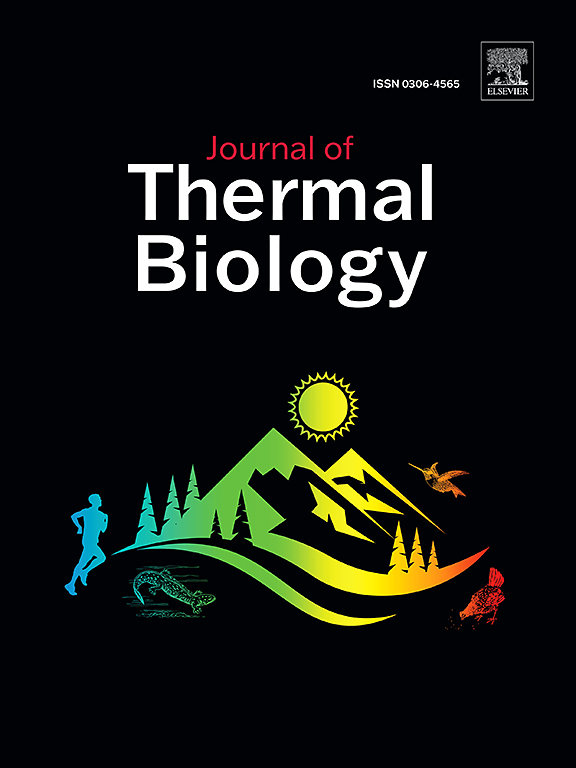添加丁酸钠对冷应激诱导的儋州鸡焦亡的调节作用
IF 2.9
2区 生物学
Q2 BIOLOGY
引用次数: 0
摘要
冷应激对雏鸡肠道健康构成重大威胁,造成经济损失和福利问题;然而,潜在的机制和有效的干预措施仍不清楚。为了研究这些方面,本研究考察了冷应激对肠道屏障完整性的影响,并探讨了补充丁酸钠的保护作用。选取45日龄肉鸡,随机分为对照组(30±1℃热中性组)和冷应激组(10±1℃冷应激组),分别处理48 h。分析肠道组织病理学、紧密连接蛋白表达、氧化应激标志物(CAT、MDA、T-SOD、T-AOC)、炎症因子(LITAF、TNF-α、IL-1β、IL-6、IL-8、IL-10)和热降解相关指标(Caspase-1、NLRP3)。冷应激显著破坏肠屏障功能,这可以通过组织病理学损伤和紧密连接蛋白表达的改变来证明。CS组表现出氧化应激增加,炎症细胞因子升高,焦亡活化增强。鉴于丁酸钠作为肠细胞的重要能量来源及其报道的抗炎特性,我们假设它可以减轻冷应激引起的损伤。为了验证这一点,用丁酸钠(1 mM)处理冷应激鸡巨噬细胞HD11体外模型。丁酸钠能有效缓解冷应激HD11细胞的氧化应激,抑制细胞焦亡。机制分析显示,这种保护作用与抑制NLRP3/Caspase-1信号通路有关。这些研究结果表明,添加丁酸钠可能通过减轻氧化应激和抑制NLRP3炎症小体介导的焦亡,减轻了肉仔鸡冷应激诱导的肠道损伤,突出了其作为保护性饮食干预的潜力。本文章由计算机程序翻译,如有差异,请以英文原文为准。
Regulation of pyroptosis by sodium butyrate supplementation mitigates cold stress-induced intestinal damage in Danzhou chicken
Cold stress poses a significant threat to intestinal health in young broilers, contributing to economic losses and welfare concerns; however, the underlying mechanisms and effective interventions remain unclear. To investigate these aspects, this study examined the effects of cold stress on intestinal barrier integrity and explored the protective potential of sodium butyrate supplementation. Forty-five-day-old broilers were randomly assigned to either a control group (CON, thermoneutral at 30 ± 1 °C) or a cold stress group (CS, exposed to 10 ± 1 °C) for 48 h. Intestinal tissues were analyzed for histopathology, tight junction protein expression, oxidative stress markers (CAT, MDA, T-SOD, T-AOC), inflammatory cytokines (LITAF, TNF-α, IL-1β, IL-6, IL-8, IL-10), and pyroptosis-related indicators (Caspase-1, NLRP3). Cold stress significantly disrupted intestinal barrier function, as evidenced by histopathological damage and altered expression of tight junction proteins. The CS group exhibited increased oxidative stress, elevated inflammatory cytokines, and enhanced pyroptosis activation. Given sodium butyrate's role as a crucial energy source for intestinal cells and its reported anti-inflammatory properties, we hypothesized it could mitigate cold stress-induced damage. To test this, an in vitro model using chicken macrophage HD11 cells subjected to cold stress was treated with sodium butyrate (1 mM). Sodium butyrate effectively alleviated oxidative stress and suppressed pyroptosis in cold-stressed HD11 cells. Mechanistic analysis revealed that this protection was associated with the inhibition of the NLRP3/Caspase-1 signaling pathway. These findings demonstrate that sodium butyrate supplementation attenuates cold stress-induced intestinal damage in broilers, likely through mitigating oxidative stress and inhibiting NLRP3 inflammasome-mediated pyroptosis, highlighting its potential as a protective dietary intervention.
求助全文
通过发布文献求助,成功后即可免费获取论文全文。
去求助
来源期刊

Journal of thermal biology
生物-动物学
CiteScore
5.30
自引率
7.40%
发文量
196
审稿时长
14.5 weeks
期刊介绍:
The Journal of Thermal Biology publishes articles that advance our knowledge on the ways and mechanisms through which temperature affects man and animals. This includes studies of their responses to these effects and on the ecological consequences. Directly relevant to this theme are:
• The mechanisms of thermal limitation, heat and cold injury, and the resistance of organisms to extremes of temperature
• The mechanisms involved in acclimation, acclimatization and evolutionary adaptation to temperature
• Mechanisms underlying the patterns of hibernation, torpor, dormancy, aestivation and diapause
• Effects of temperature on reproduction and development, growth, ageing and life-span
• Studies on modelling heat transfer between organisms and their environment
• The contributions of temperature to effects of climate change on animal species and man
• Studies of conservation biology and physiology related to temperature
• Behavioural and physiological regulation of body temperature including its pathophysiology and fever
• Medical applications of hypo- and hyperthermia
Article types:
• Original articles
• Review articles
 求助内容:
求助内容: 应助结果提醒方式:
应助结果提醒方式:


